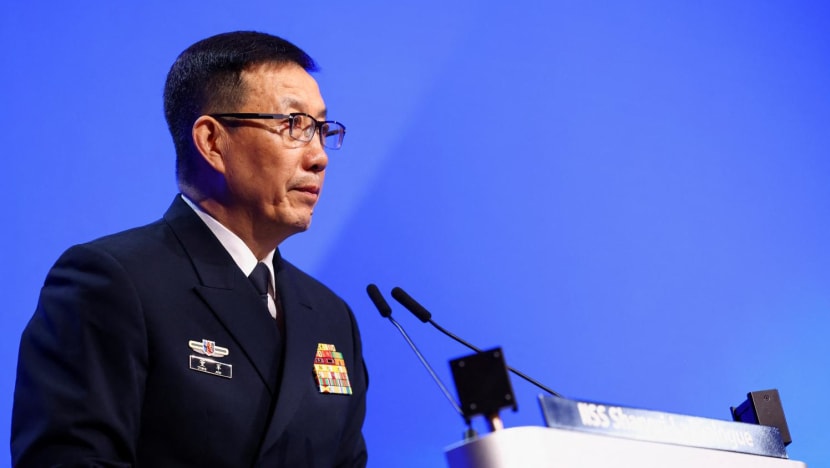Prospect of peaceful 'reunification' with Taiwan being 'eroded', says China
Speaking at the Shangri-La Dialogue in Singapore, China's Defence Minister Dong Jun also warned of "limits" to China's restraint on the South China Sea.

Chinese Defence Minister Dong Jun speaks at the Shangri-La Dialogue in Singapore, Jun 2, 2024. (Photo: Reuters/Edgar Su)

This audio is generated by an AI tool.
SINGAPORE: The prospect of peaceful "reunification" with Taiwan is being increasingly "eroded" by Taiwanese separatists and external forces, Chinese Defence Minister Dong Jun said on Sunday (Jun 2), promising to ensure independence never happens.
China views democratically governed Taiwan as its own territory, over the strong objections of the government in Taipei, and last month staged war games round the island in anger at the May 20 inauguration of President Lai Ching-te, whom Beijing calls a "separatist".
Speaking at the Shangri-La Dialogue conference in Singapore, Dong said Taiwan was the "core of core issues" for China, but Taiwan's ruling Democratic Progressive Party is incrementally pursuing separatism and bent on erasing Chinese identity.
"Those separatists recently made fanatical statements that show their betrayal of the Chinese nation and their ancestors. They will be nailed to the pillar of shame in history," he said.
"China stays committed to peaceful reunification. However, this prospect is increasingly being eroded by separatists for Taiwan independence and foreign forces," Dong said, adding that the People's Liberation Army "will remain a strong force for upholding national reunification".
"We will take resolute actions to curb Taiwan independence and make sure such a plot never succeeds."
Taiwan's China-policy-making Mainland Affairs Council said in response that it deeply regretted the "provocative and irrational" comments, and reiterated that the People's Republic of China has never ruled the island.
China has been repeatedly angered by US support for Taiwan, even in the absence of formal diplomatic ties, such as arms sales.
Dong called the arms sales a test of China's "red lines".
"They are selling a lot of weapons to Taiwan. This kind of behaviour sends very wrong signals to the Taiwan independence forces and makes them become very aggressive. I think we are clear that the foreign power's true purpose is to use Taiwan to contain China."
Andrew Yang, a former Taiwan defence minister, said Beijing has said it will pursue "reunification" by winning the hearts and minds of Taiwanese but "their deeds have yet to match their words". Beijing instead is "holding a big stick" and is "confrontational and contradictory", he said.
Yang said he hopes the US will keep to its schedule of arms sales to Taiwan so the island can enhance its self-defence.
Taiwan has for the last two years complained of delays in deliveries of US weapons, such as Stinger anti-aircraft missiles, as manufacturers supply Ukraine to support it in the war against Russia.
Taiwan's president, Lai, has repeatedly offered talks with Beijing, but been rebuffed. He says only Taiwan's people can decide their future.
SOUTH CHINA SEA
Dong also warned of "limits" to Beijing's restraint on the South China Sea, following a series of confrontations between Chinese and Philippine vessels near disputed reefs.
"China has maintained sufficient restraint in the face of rights infringements and provocation, but there are limits to this," Dong.
China Coast Guard vessels have used water cannon against Philippine boats multiple times in the contested waters. There have also been collisions that injured several Filipino troops.
Manila and Beijing have a long history of maritime territorial disputes, but tensions have worsened under Philippine President Ferdinand Marcos.
China claims almost the entire South China Sea, brushing off rival claims from other countries, including the Philippines, and ignoring an international ruling that its claims have no legal basis.
Marcos has sought closer ties with the United States as he stands up to Chinese actions in the waterway.
In remarks to the security forum on Friday, Marcos said the Philippines would not give in to Chinese pressure.
"Illegal, coercive, aggressive and deceptive actions continue to violate our sovereignty, sovereign rights and jurisdictions," Marcos said.
"I do not intend to yield," he said. "Filipinos do not yield".
BALLISTIC MISSILES
Given its position in the South China Sea and proximity to self-ruled Taiwan, which China claims as its own, Philippine support would be crucial for the United States in the event of any conflict.
The US Army said in April that it had deployed a Mid-Range Capability missile system capable of firing the Standard Missile 6 (SM-6) and the Tomahawk Land Attack Missile in the northern Philippines for annual joint exercises.
The deployment of "medium-range ballistic missiles" was "severely damaging regional security and stability", Dong said.
"Acting in this way will ultimately burn oneself."
On Saturday, US Secretary of Defense Lloyd Austin stressed that the Indo-Pacific region remained a key focus for Washington.
"Let me be clear: The United States can be secure only if Asia is secure," Austin said. "That's why the United States has long maintained our presence in this region."
The Shangri-La Dialogue, one of the world's top defence forums, has been viewed as a barometer of US-China relations in recent years.
Dong and Austin met for more than an hour on Friday, the first substantive face-to-face talks between the two countries' defence chiefs in 18 months.
In response to Austin's speech, Chinese Lieutenant General Jing Jianfeng said the US Indo-Pacific strategy was intended "to create division, provoke confrontation and undermine stability".
Some US officials say Beijing has become more emboldened in recent years, recently launching what it described as "punishment" drills around Taiwan, sending heavily armed warplanes and staging mock attacks after Lai Ching-te was inaugurated as Taiwan's president.















